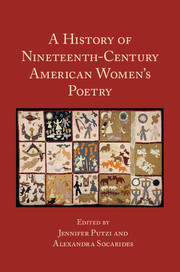Book contents
- Frontmatter
- Contents
- List of Illustrations
- List of Contributors
- Acknowledgments
- Introduction: Making History: Thinking about Nineteenth-Century American Women's Poetry
- PART I 1800–1840, AMERICAN POESIS AND THE NATIONAL IMAGINARY
- 1 Claiming Lucy Terry Prince: Literary History and the Problem of Early African American Women Poets
- 2 Before the Poetess: Women's Poetry in the Early Republic
- 3 The Passion for Poetry in Lydia Sigourney and Elizabeth Oakes Smith
- 4 Album Verse and the Poetics of Scribal Circulation
- 5 Presents of Mind: Lydia Sigourney, Gift Book Culture, and the Commodification of Poetry
- 6 The Friendship Elegy
- 7 Gendered Atlantic: Lydia Sigourney and Felicia Hemans
- PART II 1840–1865, UNIONS AND DISUNIONS
- PART III 1865–1900, EXPERIMENT AND EXPANSION
- Suggested Further Reading
- Index
5 - Presents of Mind: Lydia Sigourney, Gift Book Culture, and the Commodification of Poetry
from PART I - 1800–1840, AMERICAN POESIS AND THE NATIONAL IMAGINARY
Published online by Cambridge University Press: 21 January 2017
- Frontmatter
- Contents
- List of Illustrations
- List of Contributors
- Acknowledgments
- Introduction: Making History: Thinking about Nineteenth-Century American Women's Poetry
- PART I 1800–1840, AMERICAN POESIS AND THE NATIONAL IMAGINARY
- 1 Claiming Lucy Terry Prince: Literary History and the Problem of Early African American Women Poets
- 2 Before the Poetess: Women's Poetry in the Early Republic
- 3 The Passion for Poetry in Lydia Sigourney and Elizabeth Oakes Smith
- 4 Album Verse and the Poetics of Scribal Circulation
- 5 Presents of Mind: Lydia Sigourney, Gift Book Culture, and the Commodification of Poetry
- 6 The Friendship Elegy
- 7 Gendered Atlantic: Lydia Sigourney and Felicia Hemans
- PART II 1840–1865, UNIONS AND DISUNIONS
- PART III 1865–1900, EXPERIMENT AND EXPANSION
- Suggested Further Reading
- Index
Summary
In “Pocket Books and Keepsakes,” published in 1828, British essayist and poet Leigh Hunt observes that a signature feature of gift books is their sumptuous binding and expensive construction. In parodying lines from Christopher Marlowe's The Jew of Malta, Hunt emphasizes the connection between wealth and literary annuals:
Printed with ink with wine in it, and bound
By fellows, as at operas, in kid gloves;
Books bound in opal, sapphire, amethyst,
With topaz tooling, Eden green morocco,
That once was slippers to an emperor;
An example of conspicuous consumption, gift books were sold as luxury commodities to middle-class readers who sought to demonstrate their wealth. Critics often condemned their poor literary merit and repurposing of both artwork and literary pieces, as Hunt implies:
And full of articles of so great price,
As one of them, indifferently written,
And not ascribed unto a man of quality,
Might serve, in peril of a writ of Middlesex,
To ransom great bards from captivity.
This is the sort of publishing for me:
And thus, methinks, should noble booksellers
Discrepate matters from the vulgar trade,
And as their wealth increaseth, so inclose
Infinite profit in a little book.
The pun on “articles” – both as valuable objects and literary works – underscores the solid earnings to be made for writers and publishers. Despite gift books’ reputedly low literary value, an “indifferently written” literary work might save authors from a debtor's prison. They might also allow “noble booksellers” to rise above the “vulgar trade” of commerce by promising to “ransom great bards” and securing their authors’ reputations. His parody, then, satirizes the “infinite profit” to be made by writers and publishers; it also banks on the tendency of nineteenth-century readers to purchase expensive books as hallmarks of their class mobility and social status. As Samuel Goodrich explains about the books in his 1856 memoir, Recollections of a Lifetime, “public taste grew by feeding on these luscious gifts, and soon craved even more gorgeous works of the kind.”
Valued less for their literary merit than their surface appearance and opulence, gift books are truly presents of mind – not only do they reflect the giver's aesthetic taste, but they also bring to mind and make present to their readers an earlier era that resisted the shift to a more technological and commercial literary culture.
- Type
- Chapter
- Information
- A History of Nineteenth-Century American Women's Poetry , pp. 87 - 105Publisher: Cambridge University PressPrint publication year: 2016
- 1
- Cited by



